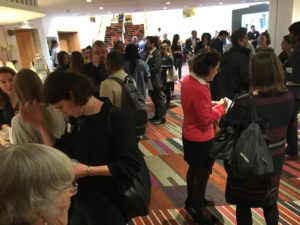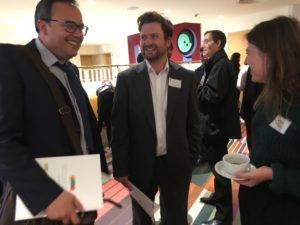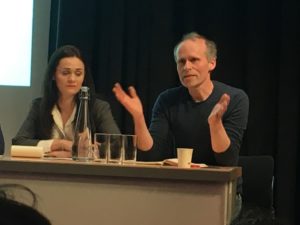HOPE not hate uses cookies to collect information and give you a more personalised experience on our site. You can find more information in our privacy policy. To agree to this, please click accept.
“The immigration debate is so loud people in the middle often don’t get heard. Engaging with this middle group – people who have mixed feelings about integration – is crucial.”
So says Rosie Carter, researcher for HOPE not hate, while presenting her findings at the National Conversation (on immigration) conference, which took place last week.
Run by HOPE not hate and British Future, the National Conversation is the largest public engagement exercise on immigration ever held in the UK.
Carter has worked with Jill Rutter, Director of Strategy and Relationships at British Future, to host over 130 conversations with members of the public in 60 locations across the UK as part of the project.

The National Conversation on immigration has fed into the Home Affairs Committee’s investigation on immigration, and will report its findings and recommendations in September.
Interim report
The ‘Immigration and Integration: getting it right locally’ conference on 18 May centred on the National Conversation’s interim report highlighting findings from its first 30 visits.
These citizen panels explored views on immigration, integration and policy options as well as whether a consensus could be reached on migration.
Contribution and control emerged as central themes in all the citizens’ panels. Participants wanted the migrants who come to the UK to make a contribution, through the skills they bring, the vacancies they fill and through taxation.
Carter and Rutter reported that most of the people taking part in the panels were ‘balancers’ – that is, they saw both the pressures and gains of immigration, and discussions focused on EU migration and refugees.
All the citizen’s panels were sympathetic to the plight of refugees but in many places this sentiment appeared fragile. There were concerns around disingenuous asylum claims and a lack of control, which was reinforced by low-level anti-Muslim prejudice.
On immigration and integration: ‘It’s not about evidence all the time, it’s often about how people feel.’ Matthew Ryder #LocalIntegration @britishfuture @nearneighbours — Heather Buckingham (@HBuckingh) May 17, 2018
Integration
The findings revealed that when there is meaningful (real-world) social contact between settled migrants and local residents, the latter base their opinions around these social interactions rather than “community narratives” drawn from the media or peer groups.
Miles Hewstone, a professor of Social Psychology at the University of Oxford, said at the conference that his studies showed reduced intergroup anxiety through contact.

“The more extended contact you have, the lower your levels of prejudice against that group,” he said. “Our studies have been highly replicable, which isn’t always the case in psychology.”
“The more extended contact you have, the lower your levels of prejudice against that group,” he said. “Our studies have been highly replicable, which isn’t always the case in psychology.”
Hewstone’s work is based on the ‘Contact Hypothesis’, which states that positive contact with a member of another group (often one negatively stereotyped) can improve negative attitudes towards that specific person but also the wider group they belong to.
He added that studies showed schools were a great place to form relationships between different communities.
Jakub Krupa, a journalist and Polish community activist, said that children born in Britain to Polish parents will be the bridge needed between communities.
Several speakers discussed solutions to local integration. Sian Sanders, Cardiff’s Community Cohesion co-ordinator, noted it was important to remember Wales had some of the oldest “superdiverse” communities, with “50 nationalities living side by side in Butetown 100 years ago”.
“Immigration has been critical to the success of the Welsh capital and we must push this narrative forward,” she said.
Doing politics better
Brexit and Windrush were both evoked during discussions on immigration and integration.
Labour MP Yvette Cooper, former Shadow Home Secretary and chair of the Home Affairs Committee, said the government had to learn from these issues.
“If you involve people you can build consensus but if you ignore public concerns, they grow. If you ignore proper debate and discussions, chances you are getting wrong,” she said.

Senator Ratna Omidvar, the keynote speaker from Canada, stressed the important of good governance and local institutions when it comes to the integration of immigrants. She also stressed the power of narratives and how language can shape values.
Omidvar lived through the Iranian revolution of 1976 and described the illusion of safety where she thought the politics wouldn’t touch them “because we were ordinary people”.
The final report on the National Conversation project will be published in September 2018.